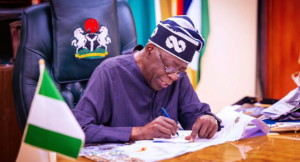…says server results are not false
The Peoples Democratic Party’s candidate in the February 23 presidential election, Alhaji Atiku Abubakar, has denied the All Progressives Congress’ allegation that he is not eligible to contest because he was not born in Nigeria.
Atiku stated this in a response to the APC’s reply to the petition he and his party jointly filed before the Presidential Election Petitions Tribunal.
He said he was born on November 25, 1946, in Jada, Adamawa State, therefore he was a Nigerian.
The APC had alleged in its response that as of November 25, 1946, when Atiku was born, Jada, was part of Northern Cameroon.
But Atiku insisted that he was a Nigerian citizen, adding that his parents were also Nigerians by birth.
He said while his father, Garba Atiku Abdulkadir, hailed from Wumo in the present-day Sokoto State, his mother, Aisha Kande, hailed from Dutse, now Jigawa State.
Atiku and the PDP said, “Contrary to the allegations contained in paragraphs 1, 2, 3, 4, 5 and 6 of the 3rd respondent’s (APC’s) reply, the petitioners state that the 1st petitioner (Atiku) is a citizen of Nigeria by birth and thus qualified to vote and be voted for and returned in the election to the office of the President of the Federal Republic of Nigeria, held on Saturday February 23, 2019 going by the relevant provisions of the 1999 Constitution (as amended).
“The 1st petitioner was born on November 25, 1946, in Jada, Adamawa State, by Nigerian parents and he is, therefore, a citizen of Nigeria by birth.
“The 1st petitioner’s father, Garba Atiku Abdulkadir, was a Nigerian by birth who hailed from Wumo in the present-day Sokoto State, while the mother, Aisha Kande, was also a Nigerian who hailed from Dutse in the present-day Jigawa State.
“The parents of the 1st Petitioner are both Fulani, a community/tribe indigenous to Nigeria.
“The birth of the 1st petitioner in Jada, in the present-day Adamawa State of Nigeria, was occasioned by the movement of his paternal grandfather called Atiku, who was an itinerant trader, from Wumo in the present-day Sokoto State to Jada in company with his friend, Ardo Usman.
“That in Jada, Atiku, the grandfather of the 1st petitioner, gave birth to Garba who in tum gave birth to the 1st petitioner and named him after his father, Atiku.
“The 1st petitioner’s mother, Aisha Kande, was the grand-daughter of Inuwa Dutse who came to Jada as an itinerant trader too from Dutse in the present-day Jigawa State.
All averments concerning Germany, British Cameroons, League of Nations and Plebiscite are false and misleading in relation to the 1st petitioner and therefore completely irrelevant more so that the 1st petitioner is a Nigerian by birth within the contemplation of the Constitution of the Federal Republic of Nigeria, 1999 (as amended).
“The averments in the aforesaid paragraphs are indeed fabricated, contrived, made in bad faith and designed to embarrass the 1st petitioner.”
The Independent National Electoral Commission had on February 27, 2019, declared that the All Progressives Congress alongside its candidate, President Muhammadu Buhari, won the February 23 election with 15,191,847 votes to defeat his closest rival, Atiku, whom it said polled 11,262,978 votes.
But the petitioners stated that “from the data in the 1st respondent’s (INEC’s) server…the true, actual and correct results” from “state-to-state computation” showed that Atiku polled a total of 18,356,732 votes defeat Buhari whom they said scored 16,741,430 votes.
INEC had in its response to the petition distanced itself from the “server results.”
The commission, through its lead counsel, Yunus Usman (SAN), had said the results of the poll were never transmitted or collated electronically.
It added that it kept no such server where such electronically transmitted results could have been obtained.
In their reply to the APC’s reply, Atiku and the PDP insisted that they truly got authentic results of the February 23 election from the Independent National Electoral Commission’s server.
They said, “In reaction to paragraph 29 of the 3rd respondent’s reply, the petitioners aver that the data and scores in the 1st respondent’s server were as transmitted by the 1st respondent’s officials and those scores are valid, and legitimate.
“The conduct of elections and declarations of results by the 1st respondent is the subject of the present petition.
“Contrary to paragraphs 31 and 34 of the 3rd respondent’s reply, the petitioners contend that the figures and scores in paragraph 22 of the petition are neither false nor contrived or concocted by the petitioners.
“Indeed, the ad hoc staff and officials of the 1st respondent in obedience to the training/instruction by the 1st respondent (INEC) transmitted the scores they got from the polling units to the 1st respondent’s server.”








